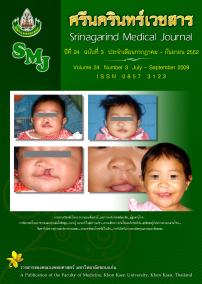ThaiScience
ThaiScience
SRINAGARIND MEDICAL JOURNAL
Volume 35, No. 04, Month JULY, Year 2020, Pages 390 - 396
Iodine deficiency disorders of the newborn and development in early childhood in sakon nakhon hospital
Somnuk Apiwantanagul, Sudarat Sirichaipornsak, Niyada Boonapai
Abstract Download PDF
Background and Objective: Thyroid stimulating hormone (TSH) levels greater than 11.2 mU/L might had lower the ability to improve development by newborns potential. This study aimed to investigate the level of TSH of newborns and development in early childhood in Sakon Nakhon Hospital. Methods: This retrospective descriptive study was conducted on 393 newborns who had TSH levels greater than 11.2 mU/L, from 6,336 newborns in Amphur Muang, Sakon Nakhon. Data were collected by reviewing TSH records developmental records and medical records. The data were collected during 2016 to 2019. The data were analyzed using descriptive statistics Results: There were 393 of 6,336 newborns ( 6.20%) had TSH levels greater than 11.2 mU/L. Two hundred and eleven cases (53.69%) had the evaluation for development. The development was categorized into four levels, including normal development (69.19%); suspected delayed development (30.81%); normal development post stimulition (56.92%); delayed development (43.08%). Infants with TSH levels less than or equal to 11.2 mU/L had more normal development than infants with TSH levels greater than 11.2 mU/L. The pregnant women of infants with TSH levels greater than 11.2 mU/L had received iodine supplement in only 227 cases in 260 cases (87.30%). Most pregnant women had received iodine supplement at a moderate level 105 cases (40.38%), low level 99 cases (38.08%), high level 56 cases (21.54%). Conclusion: There is a need to encourage all pregnant women to take an iodine supplement everyday, to reduce the incidence of newborns with TSH levels greater than 11.2 mU/L. Stimulation the newborns who TSH levels greater than 11.2 mU/L should initiate as early as possible
Keywords
Iodine deficiency disorders Development in early childhoodSRINAGARIND MEDICAL JOURNAL
Published by : Faculty of Medicine, Khon Kaen University
Contributions welcome at : http://www.smj.ejnal.com/e-journal/journal/index.php
